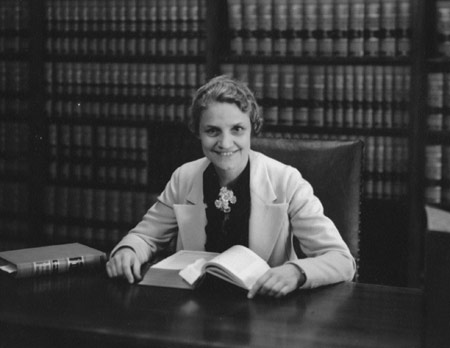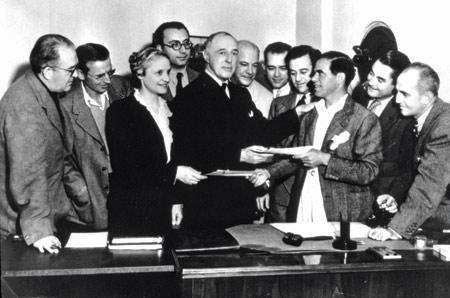BY AMY DAWES
 Appointed by Frank Capra, Mabel Willebrandt was the Guild's attorney for nearly 30 years.
Appointed by Frank Capra, Mabel Willebrandt was the Guild's attorney for nearly 30 years.
A key strategist in the final rounds of the battle to establish the Guild was its attorney, Mabel Walker Willebrandt, who arranged for the pivotal hearings before the National Labor Relations Board in Washington and also drafted the Basic Agreement of 1939, the Guild’s first contract with the studios.
Although these services might arguably have been performed by any skilled attorney, what is most significant about Willebrandt is the confidence she gave to the board. Having her in his corner was also important for Guild President Frank Capra, who had already been a client of hers and held her in high esteem.
At that time, Willebrandt had served seven high-profile years as U.S. assistant attorney general responsible for enforcing Prohibition laws—earning her a national reputation as a determined, courageous and formidably skilled prosecutor who brought down some of the most entrenched and well-funded bootleggers in the country.
After leaving the post in 1929, she established a private practice in which her many clients included entertainment industry figures such as Louis B. Mayer, W.S. Van Dyke and Capra.
Upon his election as SDG president in 1938, Capra wrote, “My first meaningful action was to acquire the wisdom, experience and brilliant legal talents” of Willebrandt, whom the Guild engaged as its counsel.
It was Willebrandt’s legal opinion, expressed in her letter of Aug. 30, 1937, to Howard Hawks, that film directors would indeed be recognized as a class of employees with the right to self-organize by the NLRB. This became a key point in the Guild’s struggle for recognition.
 BATTLE-TESTED: Willebrandt looks on as Frank Capra and "the Guild board" present the first Honorary Life Membership to D.W. Griffith in 1938, an award she was the next recipient of in 1939.
BATTLE-TESTED: Willebrandt looks on as Frank Capra and "the Guild board" present the first Honorary Life Membership to D.W. Griffith in 1938, an award she was the next recipient of in 1939.
When Capra conceived of the bold 24-hour ultimatum that finally succeeded, he had Willebrandt send it by telegram to the producers’ committee. She subsequently drafted the Basic Agreement of 1939 that became the Guild’s first contract with the Producers Association.
In a letter Capra sent to her June 1, 1939, on behalf of the SDG board, he gave her the entire credit for attaining the basic agreement.
Although her gender was much remarked upon during her career, Willebrandt was scarcely the only female attorney of her time. Her class at USC’s College of Law in 1912 included 38 female students.
More notable, perhaps, were her humble beginnings. She was born in a sod hut on a Kansas prairie and received no formal schooling until age 13. By age 22, she and her husband, Arthur Willebrandt, were living in Pasadena, Calif., where she held down a job as a school principal while putting both of them through law school. Her appointment by President Warren G. Harding to the challenging position of assistant attorney general in charge of prisons, taxes and Prohibition came just five years after she’d been admitted to the California bar.
Willebrandt continued to handle the Guild’s legal affairs until the last years of her life. She would again come to Capra’s aid in 1951 during his biggest crisis, when he faced blacklisting by the House Un-American Activities Committee. She advised him to “Fight hard. Fight with truth, but fight with passion. Get mad!” Willebrandt was also responsible for drafting the controversial loyalty oath instituted by the Guild in 1950.
At her funeral in 1963, Capra eulogized her as “an unforgettable example of courage among the timid, integrity among the hypocrites, morality among the point-shavers.” And her friend Judge John J. Sirica later observed, “If Mabel had worn trousers she could have been president.” —A.D.